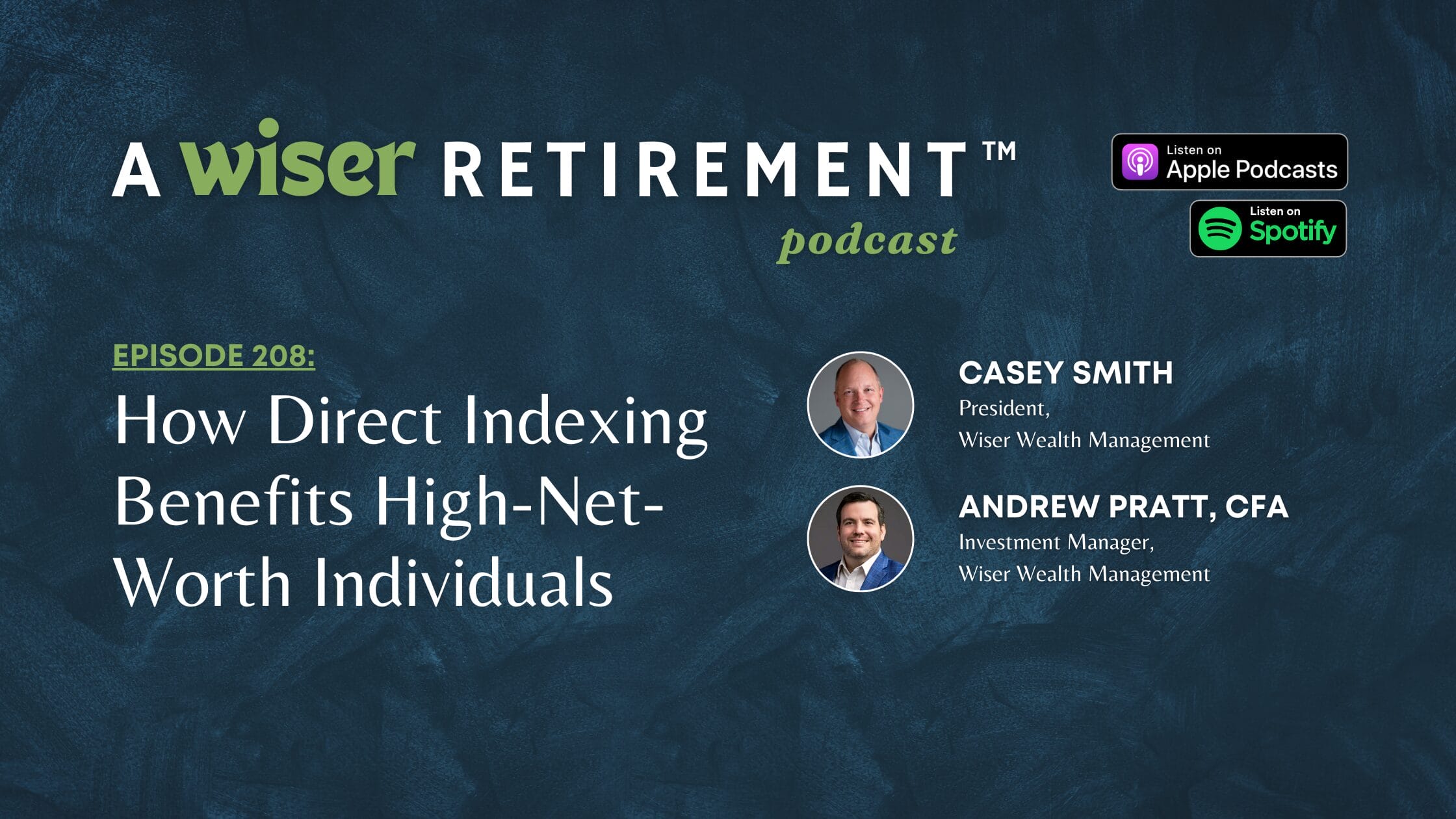
How Direct Indexing Benefits High-Net-Worth Individuals
On this episode of A Wiser Retirement™ Podcast, Casey Smith is joined by Andrew Pratt to talk about what direct indexing is, the pros and cons, and how it benefits high-net-worth individuals. Listen to this episode to see if Direct Indexing is the right strategy for you!
Listen or Watch:
Summary
What is direct indexing?
Direct indexing is an investment strategy that uses technology software to systematically optimize, or rebalance the portfolio, a legacy account to a target benchmark’s risk exposure overtime. Strategies range from broad U.S. market cap and style exposures, to even broad international equity indices
3 Primary Benefits of Direct Indexing
1. Tax Efficiency
- Maximize tax loss harvesting efficiency. Losses can be used elsewhere.
- Realized loss capture leads to after-tax outperformance vs index.
2. Reduce Concentrated Stock Risk
- You can reduce it for accounts that transfer in large basis legacy stocks.
- Recycled TLH proceeds can be recycled and used to help to reduce tracking error which leads to increased diversification.
3. It’s Customizable
- This is only recommended in certain situations, but you can exclude individual stocks or industries as long as the account stay’s within the strategy’s permitted tracking error.
3 Direct Indexing Shortcomings
1. Higher Costs
- Providers charge an asset management fee which typically ranges from 0.2% – 1.0%.
2. Higher Investment Minimums
- Most Direct Indexing providers’ minimum investment amount is $250,000.
- Larger capital outlay vs traditional investing.
3. Investment Implementation Time Lag
- It takes more time to onboard, open a SMA account, implement, etc. vs traditional investing (ETFs).
Who should be utilizing this strategy?
Direct indexing is an investment strategy best suited for a specific group of investors who can truly benefit from its unique advantages. High net worth individuals, particularly those with investable assets greater than $750,000, stand to gain significantly from direct indexing due to the personalized investment approach and potential for enhanced after-tax returns. This strategy is also highly advantageous for taxable investors who are looking to leverage core benefits such as tax-loss harvesting and the ability to tailor the portfolio to personal values or investment preferences. Additionally, direct indexing is a fitting choice for someone who is comfortable with holding a separately managed account (SMA). An SMA provides the investor with direct ownership of the individual securities in their portfolio, as opposed to owning shares of a mutual fund or ETF, allowing for a greater level of customization and tax management. Therefore, individuals fitting these descriptions are the ideal candidates for utilizing direct indexing to optimize their investment outcomes.
Links:
- Check out our blog on “Is direct indexing the right strategy for you?“
- Click here to download one of our free guides that covers financial planning topics like retirement, investing, taxes, divorce, and more!
Connect:
- Click here to schedule a consultation with one of our financial advisors.
- Follow us on social media: Twitter, Instagram, Facebook, LinkedIn, and YouTube.
- Learn more about A Wiser Retirement™ podcast and access previous episodes.
Share This Story, Choose Your Platform!
Wiser Wealth Management, Inc (“Wiser Wealth”) is a registered investment adviser with the U.S. Securities and Exchange Commission (SEC). As a registered investment adviser, Wiser Wealth and its employees are subject to various rules, filings, and requirements. You can visit the SEC’s website here to obtain further information on our firm or investment adviser’s registration.
Wiser Wealth’s website provides general information regarding our business along with access to additional investment related information, various financial calculators, and external / third party links. Material presented on this website is believed to be from reliable sources and is meant for informational purposes only. Wiser Wealth does not endorse or accept responsibility for the content of any third-party website and is not affiliated with any third-party website or social media page. Wiser Wealth does not expressly or implicitly adopt or endorse any of the expressions, opinions or content posted by third party websites or on social media pages. While Wiser Wealth uses reasonable efforts to obtain information from sources it believes to be reliable, we make no representation that the information or opinions contained in our publications are accurate, reliable, or complete.
To the extent that you utilize any financial calculators or links in our website, you acknowledge and understand that the information provided to you should not be construed as personal investment advice from Wiser Wealth or any of its investment professionals. Advice provided by Wiser Wealth is given only within the context of our contractual agreement with the client. Wiser Wealth does not offer legal, accounting or tax advice. Consult your own attorney, accountant, and other professionals for these services.





